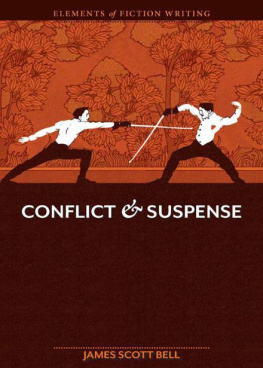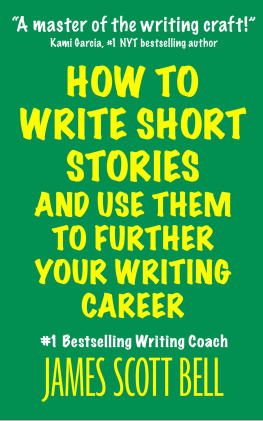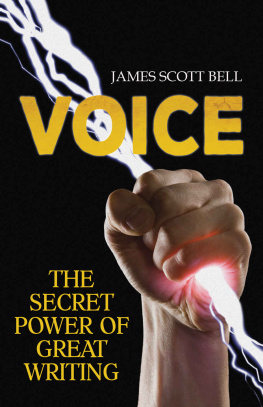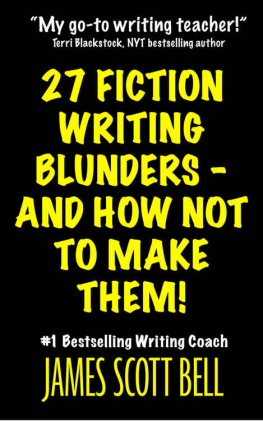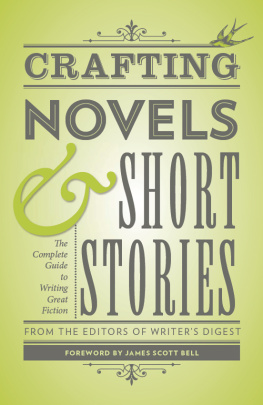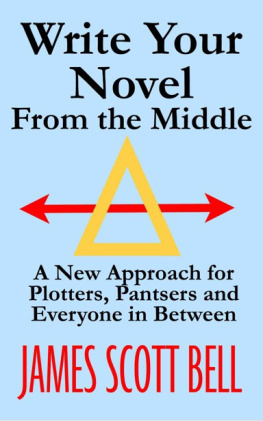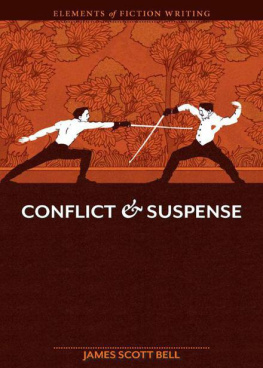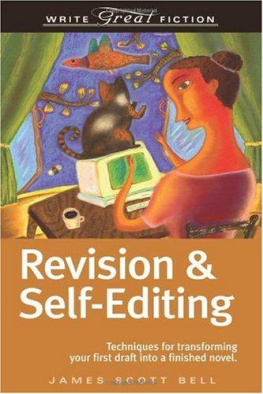Scott Bell - Elements of Fiction Writing - Conflict and Suspense
Here you can read online Scott Bell - Elements of Fiction Writing - Conflict and Suspense full text of the book (entire story) in english for free. Download pdf and epub, get meaning, cover and reviews about this ebook. year: 2011, publisher: F+W Media, Inc., genre: Art. Description of the work, (preface) as well as reviews are available. Best literature library LitArk.com created for fans of good reading and offers a wide selection of genres:
Romance novel
Science fiction
Adventure
Detective
Science
History
Home and family
Prose
Art
Politics
Computer
Non-fiction
Religion
Business
Children
Humor
Choose a favorite category and find really read worthwhile books. Enjoy immersion in the world of imagination, feel the emotions of the characters or learn something new for yourself, make an fascinating discovery.
- Book:Elements of Fiction Writing - Conflict and Suspense
- Author:
- Publisher:F+W Media, Inc.
- Genre:
- Year:2011
- Rating:3 / 5
- Favourites:Add to favourites
- Your mark:
- 60
- 1
- 2
- 3
- 4
- 5
Elements of Fiction Writing - Conflict and Suspense: summary, description and annotation
We offer to read an annotation, description, summary or preface (depends on what the author of the book "Elements of Fiction Writing - Conflict and Suspense" wrote himself). If you haven't found the necessary information about the book — write in the comments, we will try to find it.
Scott Bell: author's other books
Who wrote Elements of Fiction Writing - Conflict and Suspense? Find out the surname, the name of the author of the book and a list of all author's works by series.
Elements of Fiction Writing - Conflict and Suspense — read online for free the complete book (whole text) full work
Below is the text of the book, divided by pages. System saving the place of the last page read, allows you to conveniently read the book "Elements of Fiction Writing - Conflict and Suspense" online for free, without having to search again every time where you left off. Put a bookmark, and you can go to the page where you finished reading at any time.
Font size:
Interval:
Bookmark:
ELEMENTS of FICTION WRITING


JAMES SCOTT BELL
Trouble is my business.
R AYMOND C HANDLER
Once you get a character with a problem, a serious problem, plotting is just a fancy name for how he or she tries to get out of the predicament.
B ARNABY C ONRAD
You tell stories.
You tell stories because you want people to read them.
You want readers to be moved, entertained, maybe even enlightened.
You want to tell stories that wrap readers up and get them lost in a world youve created, with colorful characters and plots that dont let up.
It doesnt matter what genre you write in. You want all these things happening because thats what makes the magic connection in this alchemy we call fiction.
Yes, thats it. You want to make a little magic.
You can, you know.
Most aspects of the craft of writing fiction can be learned. You can practice them and put them to work for you.
Frankly, I get a little miffed when someone says fiction writing cant be taught. That would come as news to all the young writers who were instructed by teachers, editors, books, and articles. People like John Grisham, who dined monthly on Writers Digest magazine.
Or me, reading Lawrence Blocks fiction column as if it were holy writ. And then trying the things he wrote about and seeing how they worked on the page.
Ive also taught countless writers in conferences and through books on the craft, and have seen many of them break into print.
So dont buy into the idea that this craft doesnt have tools and techniques that will make you better.
What cant be taught is what you bring to your fictionyour inherent talent, background experiences, passion, and heart. The singular you.
But talent and experience mean nothing if they dont find an expression on the page that readers can relate to.
Craft teaches you how to connect with readers so they can get lost in your stories.
And what gets them lost?
It really comes down to one thing: characters who are in trouble.
It doesnt matter what kind of trouble it is so long as it is of great importance to the story people. When a reader describes getting caught up in a novel, its just shorthand for saying that trouble is happening to a character, or group of characters, and the reader wantsno, needsto see what happens.
Alfred Hitchcock said it this way: A great story is life, with the dull parts taken out.
A scene without trouble is a dull part. A character who is not caught up in trials and dangers and challenges and obstaclesinterior, exterior, or bothis not going to excite us for very long.
It doesnt matter who the character is, either. A quirky, colorful character overstays her welcome after a few chapters, unless trouble comes calling.
So trouble is your business. And conflict and suspense are the tools of the craft that will take your business to the readers.
Imagine the first storyteller. Ill call him Og. He has just returned from a hard day hunting meat. He was about to bag him some wolf when he got surprised by a mastodon lumbering by.
Bummer.
He dropped his club and ran. He hid in some rocks. An hour or so later he came back to his prey and found it being devoured by a saber-toothed tiger.
Double bummer.
Then Og had to trek back to the waiting fire. His tribe was sitting there hoping for some steaks (they were quite tired of berries and roots). They looked at Og and grunted something that can be roughly translated, Wheres the meat, man?
Og was on the spot. His position as chief hunter-gatherer was up for grabs, depending on what he said next.
The last time something like this happened, and the tribe asked what went wrong, Og merely shrugged and threw dirt at them. This didnt help matters at all. They seemed unwilling to give Og more chances.
So now Og gets on his haunches and says, I was out hunting like always, and had a wolf in my sights. I threw a rock and got him right on the head. He went down. I was about to go get him when I heard this ROAARRRR!
He pauses to take stock of the reactions around the fire. Every face is turned toward him. He can see consuming interest in their eyes.
He has them hooked.
Good, Og thinks.
Lets see if I can keep them that way while I figure out how to get out of this.
I spin around, Og says, and there is a tiger with those long, spiked teeth. There is spit dripping off those teeth. His eyes were huge, as big as lakes! I could smell his fur. It smelled like death.
The audience is leaning forward now. Og thinks, That went well. If I take time to describe things this way, it stretches out the story and the tension. And that bit about the smell, that was pure genius.
Og is beginning to develop a style.
Hes also searching for an ending, and so he lays out, beat by beat, a story of this encounter with the tiger and the ensuing fight to save his own life. He finally gets to the end and speaks of a mighty battle with the beast, until his ultimate triumph.
Someone in the audience asks, So wheres the tiger?
Og must think up a twist ending. So he comes up with the speculative fiction genre, and says a god of the mountains came down and took the tiger as tribute. He was about to call down fire from the sky on Ogs tribe. Og told him not to, that it would be bad, and he would fight the god if he had to. The god relented.
So Og has saved all their lives. Or so the story goes.
Well, the reaction of the listeners is so good that Og gets a double portion of berries. An attractive woman gives him a blanket of squirrel fur in honor of his exploits. One of the old men gives Og his best club. A couple of the younger tribe members hand over their favorite trinkets and promise more if Og will tell more stories.
And Og thinks, Maybe I can make a living at this.
Ogs brother, who collects the booty, keeps 15 percent of it.
So Og starts telling stories every night by the fire instead of hunting for food. His tales inspire the other men to go out and hunt. Encouraged by Ogs fiction, they become brave and successful. They give Og a portion of everything they gather.
Og buys a new luxury cave with an interior pool.
What Og discovered was that a story with trouble and threat, drawn out and told with a certain lan, is what keeps people interested and willing to pay for more. This is the true essence of story, a record of how a character deals with high-stakes trouble. In the case of Ogs first tale it was physical death on the line. Og had a thriller on his tongue.
But Og later told stories about his emotions. How he was having to deal with past demons, like his father flicking pebbles at him when he was a boy, and when he fell in love with a cave girl who later got stepped on by a wooly mammoth. He notices that the women of the tribeand, in secret, even some of the mencry during the telling of these tales.
And pay him to tell more.
Og starts calling these character-driven stories but knows they are based on the same idea: a high-stakes threat to the characters interior life and happiness.
And you know what? The essence of story has not changed, from Og to the early myths to the Greek drama to Stephen King to Lost and Pixar.
Its all about trouble and its two best friendsconflict and suspense.
Font size:
Interval:
Bookmark:
Similar books «Elements of Fiction Writing - Conflict and Suspense»
Look at similar books to Elements of Fiction Writing - Conflict and Suspense. We have selected literature similar in name and meaning in the hope of providing readers with more options to find new, interesting, not yet read works.
Discussion, reviews of the book Elements of Fiction Writing - Conflict and Suspense and just readers' own opinions. Leave your comments, write what you think about the work, its meaning or the main characters. Specify what exactly you liked and what you didn't like, and why you think so.

